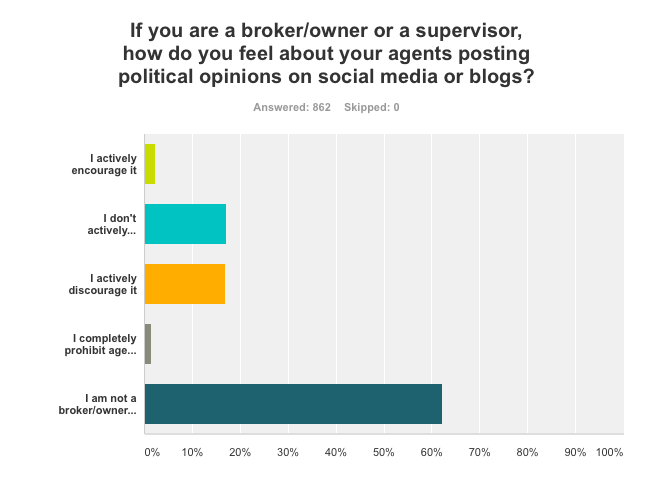- Sixty-six percent of Inman survey takers said they have never shared their political opinions on social media, and 49 percent said they would not disclose their voting choices.
We’ve made it: The 2016 election cycle is coming to a close, after nearly 600 days of campaign commercials, press conferences, rallies, debates and controversies that have revealed the yet-to-be-solved chasm between people of different cultural, economic, racial and religious backgrounds.
Throughout the past two years, Americans have taken to social media to fully exercise their First Amendment rights and share their political opinions, frustrations and fears.
But where should people draw the line? Is it appropriate for professionals who serve a wide range of people — such as real estate agents and brokers — to share opinions that could offend current and potential clients?
 More than 800 Inman readers chimed in on a recent poll and gave a resounding “no,” with more than 66 percent of readers saying they don’t post their political opinions on a blog or social media page.
More than 800 Inman readers chimed in on a recent poll and gave a resounding “no,” with more than 66 percent of readers saying they don’t post their political opinions on a blog or social media page.
Coming in a distant second place, 25 percent of readers said they occasionally share their opinions, and only 8 percent said they do so frequently.
 Furthermore, 49 percent said they wouldn’t disclose their voting choices on social media, and 36 percent said they would only do so if they were asked about it directly.
Furthermore, 49 percent said they wouldn’t disclose their voting choices on social media, and 36 percent said they would only do so if they were asked about it directly.
Only 15 percent said they would disclose their voting choices on a blog or on social media.
 Sixteen percent of broker/owners who took the survey said they “actively discourage” their agents from sharing their political views on social media and another 17 percent said they don’t actively encourage their agents to share their opinions, but they don’t mind when it happens.
Sixteen percent of broker/owners who took the survey said they “actively discourage” their agents from sharing their political views on social media and another 17 percent said they don’t actively encourage their agents to share their opinions, but they don’t mind when it happens.
A mere 2.3 percent said they actively encourage it, and an even smaller 1.5 percent said they completely prohibit agents under their supervision from sharing political views on social media.
Some things are better left unsaid
For respondents who wouldn’t share their political opinions on social media, one clear reason rose to the top: the fear of losing or alienating clients who don’t share the same views.
“It’s suicide. Plain and simple,” said a respondent. “You likely have social media friends whom you also do business with. You want to alienate half of them? Remember what mom always said, ‘Don’t discuss politics or religion.’ She was right.”
But as some readers noted, it’s hard to completely stay out of the political fray when much of our Facebook news feeds, Twitter timelines, TV screens and newspaper covers are filled with news about the election, and that sometimes clients will initiate conversations about politics.
In these situations, readers said, it’s okay to give neutral, tactful responses.
“If a client brings up an opinion that I agree with, I’m happy to express that I also agree and why. But, I’m not telling them that I’m voting that side,” a reader said.
Shelley Rossi, VP of Communications for Windermere, says her brokerage prefers that agents avoid talking politics on social media, but if they decide to do so, that neutral statements are best.
“I don’t see anything wrong with making general statements, such as encouraging one’s friends to vote, if that is something an agent feels very strongly about doing,” Rossi says.
But she notes anything beyond that can damage an agent’s reputation and relationships with clients who are from various backgrounds, races and political beliefs.
Furthermore, she notes, the public doesn’t understand that agents are “independent contractors,” and therefore an agent’s opinion can unfairly impact the brokerage as a whole.
“The general public doesn’t understand that real estate agents are independent contractors, rather than employees of Windermere. Or that Windermere offices are all independently owned,” Rossi says.
“They see Windermere as one collective brand. Therefore, what one individual says can reflect on the entire organization.”
Authenticity counts
Those who share their political opinions on social media said the traditional business etiquette rules of avoiding conversations about politics, race and religion are outdated, and that clients want to have authentic interactions with the agents they’re working with.
“Authenticity matters. People are attracted to your realness. So be you. That said, be your best you. If you are authentically a jerk, you might want to work on becoming a better you,” a respondent said.
“So, as that relates to politics, be thoughtful and gracious with your opinions. You may lose some over your stance, but you’ll become a champion to those that agree. I’d much rather be highly regarded by half the people than sort of known by all.”
That’s the attitude Kim Colaprete and Chavi Hohm have taken throughout their years as real estate agents and broker owners of Team Diva Real Estate in Seattle.
A few weeks ago, Colaprete and Hohm boldly proclaimed: “We are with her!” in a blog post outlining their support for Hillary Clinton.
In the post, the couple praised Clinton for her views on women’s rights and healthcare, equality for LGBTQ, immigrant and minority communities, and creating a system where equal pay and affordable higher education is something that anyone, regardless of their background, can access.
“Chavi and I both have political/ non-profit backgrounds and have always been fairly open about our political views in our personal as well as professional life,” said Colaprete.
“Also, when you are a lesbian couple running a business together there is no “hiding” who you are and what you stand for. In fact, WHO we are and WHAT we stand for is what makes Team Diva successful.”
Although their outspokenness has been essential to their success, Colaprete noted they’ve received pushback for Clinton blog post and previous posts that outlined their stances on marriage equality and other important issues.
However, she adds that it’s an opportunity to create an environment where colleagues, clients and community members can speak intelligently, candidly and without fear of being attacked.
“Whether everyone agrees with you or not — as long as you are being true to you and being clear and respectful — folks will respect you back,” Colaprete said.
“Let folks know in your blog post that you are open to ‘intelligent, respectful discourse,’ address the angry comments with reason and see if you can build a bond with those who disagree.”
She notes there will be people who will “troll” and purposely try to create discord. In those instances, Colaprete said she freely uses the delete and block buttons and regains control of the conversation.
“You can delete those comments — it’s your Facebook page, your blog site; you control it.”
Colaprete concludes with this: Sharing political opinions can be a way to establish yourself as a community leader who can be trusted to be honest, straightforward and fair — all of which are attributes that are critical to being a successful agent and owner.
“Relate your opinion back to your sphere, your neighborhood, your clients and your city,” she said.
“The whole point of making a political statement it to compel folks to take a stand with you! Talk about how the issue you are discussing directly impacts those in your sphere, your city or your community.
“Being a leader in your community is not easy, but it can be rewarding.”













